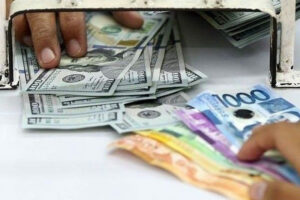By Aubrey Rose A. Inosante, Reporter
THE Department of Finance (DoF) said US President Donald J. Trump’s proposed tax on remittances will put a “minimal” dent of between $19.1 million and $148.4 million on money sent home by overseas Filipinos.
“We see that the estimated effect is minimal on the economy. The expected loss in remittances might only be $19.1 million to $148.4 million, out of the $36.5 billion projected remittances in 2026,” the DoF told BusinessWorld on Thursday.
The central bank has maintained its cash remittance growth projection at 2.8% this year and 3% for 2026.
Mr. Trump’s so-called One Big Beautiful Bill, which more broadly sets out his administration’s taxation plans, won Senate approval with some modifications from the US House of Representatives bill approved in May.
Among the key changes is a 1% excise tax on all remittances, which also apply to US citizens, softening the initially proposed 3.5% levy targeting foreign workers.
The bill will go before the House again, and may require reconciliation before proceeding to final passage and the President’s signature.
The DoF said the US Senate version of remittance tax will affect 4.4 million overseas Filipinos in the US.
“Although 41% of remittances are routed through the US, not all of these are from Filipinos in the US because remittances are routed to the US via correspondent banks,” it said.
Cash remittances rose 3% to $34.49 billion in 2024. The US remained the top source of cash remittances, accounting for 40.6% of the total.
Mon Abrea, founder and chief tax advisor of the Asian Consulting Group (ACG), said the legislation will slow down remittance flows—either by reducing the volume of formal remittances or by driving them underground.
“While the Department of Finance estimates the impact at only 0.003% of GDP, this additional burden may push senders — especially undocumented Filipinos — to use informal or unregulated channels, which are riskier and harder to monitor,” he said.
The lower rate on remittances in later versions of the legislation offers some relief to overseas Filipino workers, but could still dampen remittances and consumption.
“Certainly, the lower rate is much better. To the extent that this tax is imposed only on US-based remittances, then the negative impact is likely less, and not only because the rate is lower at 1%,” Calixto V. Chikiamco, president of the Foundation for Economic Freedom, said.
“However, the impact on our economy is that the amount that OFW families receive here will be less and they will likely reduce their spending,” he said.
Pantheon Macroeconomics Chief Emerging Asia Economist Miguel Chanco said the rate reduction is a “positive development.”
Over the long haul, Mr. Chanco believes that money transfers will not materially be affected even if the 3.5% rate were reimposed.

